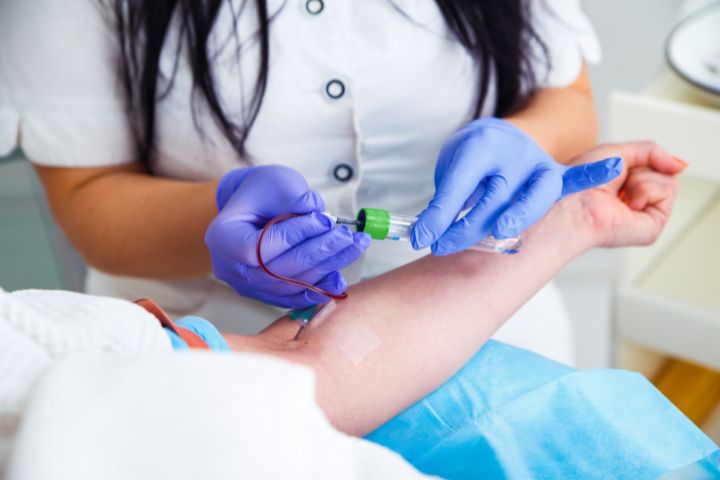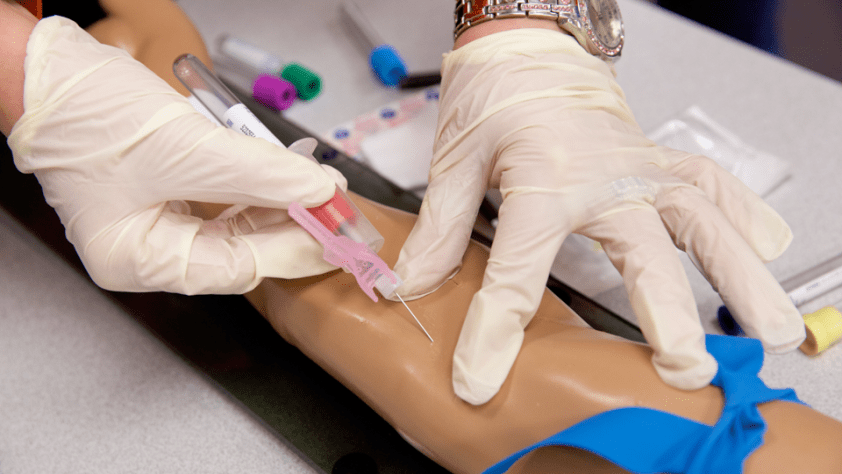Phlebotomy school FAQs: Get Informed Before You Begin
Phlebotomy school FAQs: Get Informed Before You Begin
Blog Article
The Path to Qualification: Comprehending the Phlebotomy Training Program Trip and Its Significance
As you consider the path to qualification in phlebotomy, it is very important to recognize the duty you'll play in healthcare. Your training will cover important skills, from blood collection techniques to patient communication. Each part of the program prepares you for the obstacles ahead. What precisely does the trip require, and why is accreditation so important for your future profession? Allow's discover these concerns further.

The Function of Phlebotomists in Health Care
Phlebotomists play a vital function in the health care system, serving as the important link between people and essential diagnostic testing. You'll perform blood attracts, making sure examples are gathered properly and safely. Your competence helps in identifying medical conditions, keeping track of health and wellness, and assisting therapy choices.
In your day-to-day communications, you'll need to develop count on with individuals, making them feel comfortable throughout what may be a stressful experience. You are accountable for identifying and taking care of examples meticulously to stop contamination or mistakes, which can impact test outcomes.
Beyond this, you'll frequently function alongside doctors and registered nurses, communicating vital details concerning individuals' problems. By understanding your skills, you contribute meaningfully to patient treatment, making you an essential part of the clinical team.
Summary of Phlebotomy Training Programs
When exploring phlebotomy training programs, you'll discover different types designed to fit various routines and discovering styles. Each program aids you create important skills like blood collection and person interaction. Comprehending these choices is essential to picking the right course for your job.
Sorts Of Training Programs
A number of kinds of training programs are available for those looking to end up being efficient in phlebotomy. Additionally, some health centers and clinics use on-the-job training programs, giving practical experience while you learn. Whatever course you select, each program aims to furnish you with the needed abilities for an effective phlebotomy occupation.

Secret Abilities Established
Mastering phlebotomy requires a collection of essential abilities that are established with complete training programs. You'll discover technical abilities like appropriate vein selection, needle insertion, and blood collection strategies. These hands-on techniques ensure you can do procedures safely and effectively. Additionally, interaction abilities are fundamental; you'll need to connect with clients, explain procedures, and placed them comfortable. Understanding composition and physiology is essential, too, as it assists you locate capillaries and recognize the body's action to blood draws. Finally, you'll get knowledge of safety and security procedures and infection control, guaranteeing you preserve a clean and sterile atmosphere. Each of these skills is important for your success as a licensed phlebotomist, making you an important possession in any type of medical care setup.
Trick Parts of a Phlebotomy Program
In a phlebotomy program, you'll concentrate on vital subjects that lay the groundwork for your future job. You'll engage in hands-on training that permits you to apply what you have actually learned in real-world setups. Both the core educational program and functional experience are important for your success as a phlebotomist.
Core Curriculum Overview
While seeking a phlebotomy training program, you'll come across a curriculum developed to outfit you with fundamental abilities and knowledge. Phlebotomy Training Course. This educational program generally consists of anatomy and physiology, concentrating on the circulatory system and understanding blood components. You'll also find out about different sorts of blood collection approaches, consisting of venipuncture and capillary slit strategies
Furthermore, infection control and security procedures are important elements, ensuring you recognize just how to preserve a sterile setting. You'll study patient communication, stressing communication and empathy, which are critical for easing client anxiousness. Finally, honest and lawful factors to consider will certainly be resolved, preparing you for real-world obligations. This fundamental understanding will enable you to succeed as a phlebotomist and give high quality treatment in content clinical settings.
Hands-On Training Experience
Getting hands-on experience is an indispensable part of your phlebotomy training course. This useful training permits you to use what you have actually found out in a real-world setting, improving your abilities and confidence. You'll exercise venipuncture techniques, find out just how to handle different kinds of samplings, and obtain familiar with the tools used in the area. Under the advice of experienced trainers, you'll refine your abilities, ensuring you're prepared for any type of situation you may deal with.
Additionally, you'll obtain the chance to communicate with people, which is crucial for developing your interaction abilities. This mix of technological efficiency and interpersonal skills is important for your success as a certified phlebotomist. Eventually, hands-on training is where theory meets practice, strengthening your understanding and readiness for certification.
Accreditation and Licensing Requirements
Prior to you can begin your job in phlebotomy, it is essential to recognize the certification and licensing requirements that vary by state. Most states need phlebotomists to hold an accreditation from an identified company, such as the National Phlebotomy Organization or the American Culture for Clinical Pathology. These certifications normally involve passing an exam that tests your knowledge and skills in the area.
Along with qualification, some states have certain licensing requirements. You might require to complete a certain variety of hours in medical technique, send evidence of training, or undertake a background check. It is very important to investigate your state's policies to see to it you fulfill all necessary standards.
Remaining informed about these demands not only aids you secure a setting but additionally boosts your reliability as a professional. By meeting these demands, you'll be well on your method to a successful career in phlebotomy.
Hands-On Training and Practical Experience
Hands-on training and useful experience are important elements of your phlebotomy education, as they enable you to apply theoretical understanding in real-world circumstances. During your training, you'll engage in go to the website supervised venipuncture, discover appropriate methods, and become familiar with different blood collection tools. This straight involvement is essential for constructing your confidence and honing your abilities.
You'll work very closely with experienced experts that can direct you via the nuances of individual interaction and example handling. Each practice not only reinforces your understanding however likewise prepares you for the hectic environment of healthcare settings.
Furthermore, several programs incorporate medical rotations, permitting you to experience varied settings, from health centers to outpatient centers. This exposure aids you adjust to various obstacles and person demands, guaranteeing you're well-prepared for your future function. Accept these chances, as they're important to coming to be an experienced and caring phlebotomist.
Challenges Dealt With During Training
While gaining hands-on experience is necessary, it is essential to recognize the challenges that can occur throughout your phlebotomy training. You could run into anxiety when performing treatments on real clients, specifically if you're brand-new to the atmosphere. The pressure to obtain everything right can be frustrating. Additionally, grasping the skills required for blood draws takes technique; you may struggle with technique initially.
Time management can also be an obstacle, as harmonizing theory, functional sessions, and individual dedications can really feel intimidating. You might encounter differing finding out speeds amongst your peers, leading to sensations of insecurity if you assume you're falling behind. Adapting to the different characters of trainers can be difficult, as each may have a special mentor style.
Acknowledging these barriers beforehand can prepare you for success and help you establish resilience throughout your training journey.
Profession Opportunities After Qualification

As you obtain experience, you might even take into consideration concentrating on areas like pediatric or senior citizen phlebotomy, accommodating particular patient requirements. Some phlebotomists pick to advance their professions by becoming laboratory specialists or seeking additional education in health care fields.
In addition, your qualification can bring about duties in training or monitoring new phlebotomists, permitting you to share your understanding. With the medical care sector continually expanding, your skills will certainly constantly be in need, leading the way for a stable and fulfilling career. Embrace the possibilities waiting for you!
Frequently Asked Questions
What Is the Typical Duration of a Phlebotomy Educating Program?
Phlebotomy training courses normally last around four to 8 weeks. You'll take part in hands-on practice, class guideline, and on the internet learning. Finishing this training prepares you for qualification and a gratifying profession in health care.
Are Online Phlebotomy Courses Available?
Yes, online phlebotomy programs are offered. They use flexibility and comfort, permitting you to research at your own speed. Simply verify the program is certified to meet certification needs and obtain important skills for your career.
Just How Much Does Phlebotomy Training Usually Cost?
Phlebotomy training normally sets you back in click now between $700 and $2,500, depending upon the program and area. You should take into consideration elements like course size, included materials, and hands-on experience when picking the ideal training for you.
What Prevail Requirements for Phlebotomy Training?
Common requirements for phlebotomy training commonly include a secondary school diploma or GED, booster shots, and a history check. Some programs may also need standard health care understanding or accreditations, ensuring you're prepared for hands-on training.
Can I Work While Completing My Phlebotomy Training?
Yes, you can function while completing your phlebotomy training. Several pupils balance jobs with their research studies, yet ensure to handle your time effectively to assure you fulfill both job and training dedications successfully.
Report this page